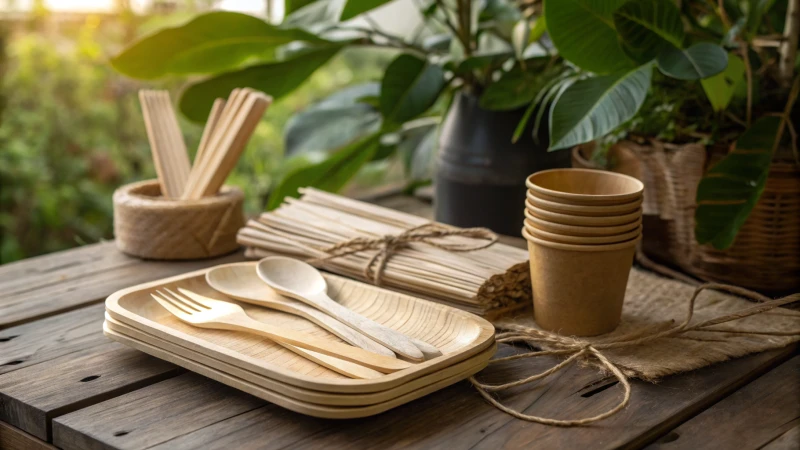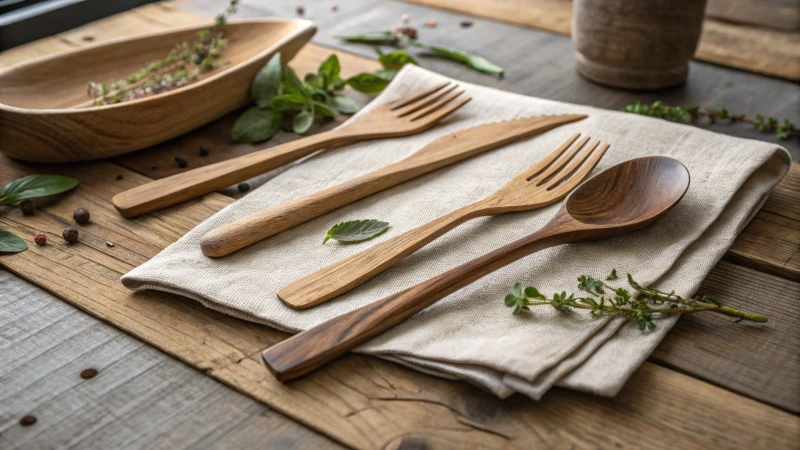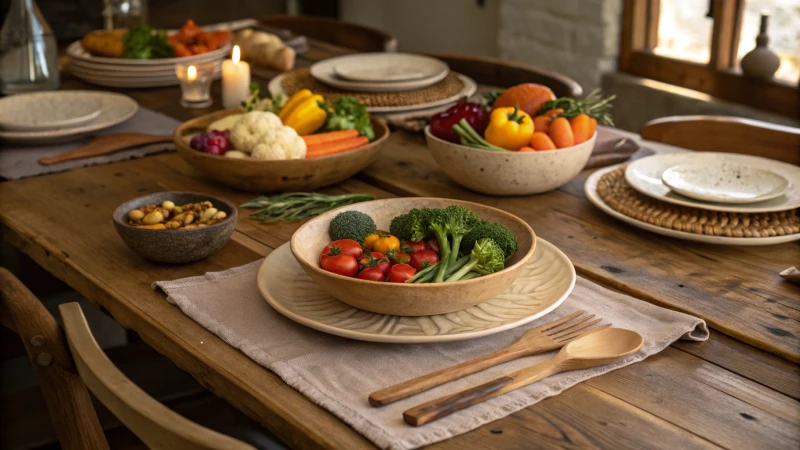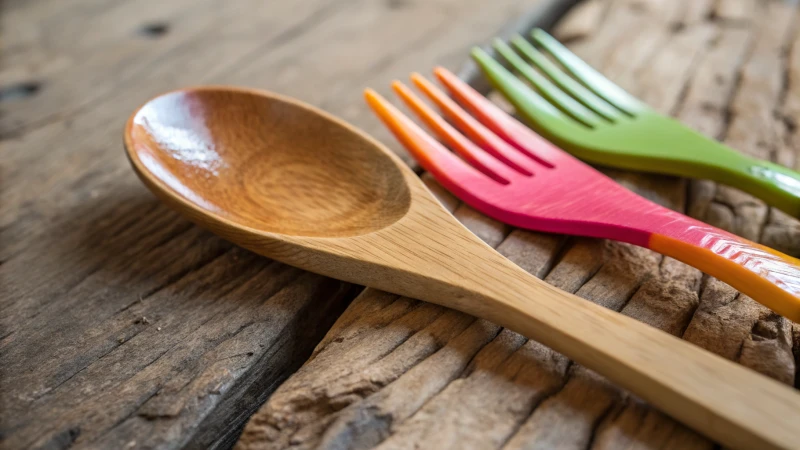
Remember the last time you threw a party and wanted to impress your eco-conscious friends? Choosing the right cutlery is more than just a decision—it's a statement.
Consumers prefer disposable wooden cutlery because it's eco-friendly and biodegradable, cutting down on plastic waste. Plus, it’s a safer choice, free from harmful chemicals in plastics, and its natural look adds a special touch to dining.
I remember planning a picnic, wanting everything to be perfect. Opting for wooden cutlery wasn't just about going green; it was about making sure everyone felt good about their choices. Beyond the obvious benefits like reducing plastic waste and avoiding harmful chemicals, there’s something satisfying about the texture and look of wooden cutlery. It adds a rustic charm to meals that even the most luxurious metal cutlery can't quite match.
Digging deeper into this choice reveals how our values drive us. Whether it’s aligning with environmental consciousness or simply enjoying the aesthetic appeal, wooden cutlery serves up more than just functionality. It’s an easy way to make everyday dining experiences feel special while doing our bit for the planet.
Disposable wooden cutlery is biodegradable.True
Wooden cutlery breaks down naturally, reducing environmental impact.
Plastic cutlery enhances the dining experience more than wood.False
Wooden cutlery offers a natural aesthetic, enhancing dining experiences.
What Are the Environmental Benefits of Wooden Cutlery?
Imagine sitting at a picnic, surrounded by nature, and knowing your utensils are as eco-friendly as the scenery.
Wooden cutlery benefits the environment by being biodegradable, reducing fossil fuel reliance, and minimizing carbon emissions. It's a sustainable alternative to plastic, helping cut waste and supporting ecological balance.

Biodegradability and Waste Reduction
I remember when I first swapped out plastic cutlery for wooden during family gatherings. It felt good knowing that as we enjoyed our meals, our utensils would return to the earth rather than clutter a landfill. Unlike their plastic counterparts, wooden utensils naturally decompose, giving back to the soil without leaving harmful residues. This means they reduce landfill waste significantly and promote environmental health1.
Renewable Resource Utilization
The first time I learned that wooden cutlery is made from fast-growing trees like birch or bamboo, it was a game-changer. These trees are renewable resources, unlike the oil-dependent plastic, which means choosing wood supports sustainable forestry and reduces our reliance on finite fossil fuels. It's like picking apples from a tree – they keep growing back!
| Material | Source | Renewable? |
|---|---|---|
| Wood | Trees | Yes |
| Plastic | Oil | No |
Lower Carbon Footprint
When I discovered that wooden cutlery production emits fewer greenhouse gases, it felt like my small choice was making a big difference. The energy used often comes from renewable sources, shrinking the carbon footprint even further. It's reassuring to know that even my picnic essentials can contribute to a greener planet and enhance its sustainability2.
Non-Toxic and Safe
Having read stories about plastics leaching chemicals into food, I was relieved to switch to wooden cutlery. It’s non-toxic and safe, not just for us humans but also for wildlife should it find its way into natural habitats.
Consumer Preference and Psychological Impact
As someone who is always on the lookout for eco-friendly options, I've noticed how wooden cutlery fits seamlessly into this lifestyle. It appeals to people who care about sustainability and offers a tactile dining experience that connects us more closely with nature. It's more than just utility – it's an experience valued by those who appreciate sustainable living3.
Comparing Wooden Cutlery with Alternatives
While metal utensils are great for reuse, their initial production involves significant mining and energy use. Wooden cutlery provides a single-use option that minimizes environmental impact, perfect for events4 and public gatherings where disposables are necessary.
Wooden cutlery is biodegradable and reduces landfill waste.True
Wooden utensils decompose naturally, unlike plastic, reducing landfill waste.
Plastic cutlery has a smaller carbon footprint than wooden cutlery.False
Wooden cutlery production emits fewer greenhouse gases than plastic.
How Does Wooden Cutlery Enhance the Dining Experience?
Imagine transforming your dining table into a haven of sustainability and charm with just a few wooden utensils.
Wooden cutlery enhances dining by offering a sustainable, aesthetically pleasing, and tactile experience. Its biodegradable nature, warmth, and unique texture elevate the overall enjoyment of meals.

The Environmental Advantage of Wooden Cutlery
Whenever I set my table with wooden cutlery, I feel a small sense of victory for the planet. These utensils are eco-friendly champions, naturally breaking down without leaving a trace, unlike their plastic counterparts that seem to linger forever. It's like giving Mother Nature a high-five every time we dine. This makes them a preferred choice5 for environmentally conscious consumers who seek to reduce their carbon footprint.
Aesthetic Appeal and Customization
I remember the first time I laid out wooden cutlery for a dinner party. The warm, earthy tones instantly added a rustic elegance to the table setting, turning a simple gathering into something special. Plus, many of these utensils can be customized—imagine having your own logo or design engraved. It’s like adding a personal touch to every meal, making it unique and memorable.
| Benefits | Plastic Cutlery | Wooden Cutlery |
|---|---|---|
| Eco-friendliness | ❌ | ✅ |
| Aesthetic Value | ❌ | ✅ |
| Customization | Limited | Extensive |
Moreover, many manufacturers offer customization options, allowing businesses to engrave logos6 or designs that align with their brand image.
Health Considerations
Another reason I gravitate towards wooden cutlery is the peace of mind it brings. Unlike plastic, which can sneak harmful chemicals into our food, wood is naturally safe. It's reassuring to know that what I'm eating with is as wholesome as the meal itself. Wooden cutlery offers health benefits by avoiding the chemicals often found in plastic alternatives. Plastics can leach harmful substances into food, especially when heated. Wooden cutlery eliminates this risk, ensuring a safer dining experience7.
The Tactile Experience
There's something about the feel of wooden cutlery that I just love. It’s not just about how it looks but how it feels—smooth and lightweight; it adds an unexpected layer of enjoyment to eating. This tactile delight has even made its way into fine dining restaurants where every sensory detail counts in crafting an unforgettable experience. This sensory element often results in a more enjoyable dining experience, making it a popular choice in fine dining establishments8.
Wooden cutlery is biodegradable and eco-friendly.True
Wooden cutlery naturally decomposes, unlike plastic, reducing environmental impact.
Plastic cutlery offers more customization than wooden cutlery.False
Wooden cutlery allows extensive customization, including engraving logos, unlike plastic.
What Are the Health Benefits of Choosing Wooden Cutlery Over Plastic?
Imagine swapping your everyday plastic fork for something that feels more natural, like wooden cutlery. Could this simple change boost your health and help the planet?
Wooden cutlery offers health benefits over plastic as it lacks harmful chemicals like BPA, which can seep into food. Unlike plastic, wooden utensils are biodegradable, minimizing environmental harm.

Health Risks Associated with Plastic Cutlery
I remember the first time I learned about the dangers lurking in everyday plastic utensils. It was during a summer barbecue when a friend casually mentioned how heat could make these plastics release chemicals like Bisphenol A (BPA) and phthalates into our food. Alarmed, I dug deeper and discovered that these substances are linked to serious health issues, such as hormonal imbalances.
| Chemical | Potential Risk |
|---|---|
| BPA | Hormonal Disruption |
| Phthalates | Endocrine Problems |
Benefits of Wooden Cutlery
Switching to wooden cutlery felt like a breath of fresh air. Not only do these utensils come from natural materials devoid of harmful additives, but they also align with my desire for a more sustainable lifestyle. I once hosted a dinner party where the rustic charm of wooden forks and spoons sparked conversations about our shared responsibility towards the environment.
- Non-Toxic: Free from chemical additives found in plastics.
- Biodegradable: Breaks down naturally without harming the environment.
- Aesthetic Appeal: Provides a rustic and authentic dining experience.
Wooden utensils offer an eco-friendly option that aligns with health-conscious and sustainable living. Moreover, they provide a unique sensory experience9 that many users find appealing.
Environmental Considerations
The impact of my decision became clearer when I considered the environmental footprint. Plastic takes centuries to decompose, while wooden cutlery breaks down much quicker, often sourced from renewable resources that can be replenished. Choosing wood means less waste in our landfills and a step towards more sustainable practices.
- Renewable Resources: Trees can be replanted to replenish stocks.
- Reduced Waste: Less non-biodegradable waste in landfills.
Switching to wooden cutlery also reduces your carbon footprint. Unlike plastic, which can take hundreds of years to decompose, wooden utensils decompose much faster.
Consumer Preferences
I’ve noticed a shift among my friends and family; there's a growing preference for wooden cutlery among those who are eco-conscious. This trend mirrors a broader awareness about the environmental and health implications of our choices. Personally, I appreciate the natural feel of wood compared to the sterile nature of plastic—it’s like bringing a piece of nature into every meal.
There is also a growing preference10 for wooden cutlery among eco-conscious consumers. Consumers appreciate the natural texture and feel of wood as opposed to the often sterile and generic feel of plastic.
By taking these factors into account, we can make choices that benefit our health and the planet.
Plastic cutlery contains harmful chemicals like BPA.True
Plastic cutlery often contains chemicals such as BPA, linked to health risks.
Wooden cutlery is non-biodegradable and harmful to the environment.False
Wooden cutlery is biodegradable and eco-friendly, unlike plastic.
What Are the Economic Implications for Businesses Switching to Wooden Cutlery?
Imagine trading in your plastic forks for wooden ones and discovering how this choice impacts your business's finances.
Switching to wooden cutlery involves higher initial costs due to pricier materials and production but can lead to long-term savings by boosting brand value and fostering customer loyalty. Balancing these financial factors with environmental benefits and market demand is crucial for businesses considering this transition.

Cost Analysis: Initial Investments Versus Long-Term Savings
You know, I remember the first time I held one of those sleek, smooth wooden spoons at a friend's eco-friendly café. It felt different—substantial, even a bit classy—and that got me thinking about the cost of making such a change in my own business. Transitioning to wooden cutlery definitely involves upfront costs like sourcing sustainable materials11 and adjusting our manufacturing processes. Compared to plastic, wooden utensils are pricier because of their raw materials and how they're made.
| Cost Factor | Wooden Cutlery | Plastic Cutlery |
|---|---|---|
| Material Costs | Higher | Lower |
| Manufacturing | Higher | Lower |
| Packaging | Eco-friendly | Standard |
But here's the thing: over time, these costs might actually pay off. I've seen it firsthand—reduced waste management costs and potentially lower taxes associated with eco-friendly practices can add up to significant savings. Plus, research12 shows that eco-conscious consumers are often willing to pay more for sustainable products, which can help balance out those initial expenses.
Market Demand and Consumer Preferences
There's a real shift happening out there. Customers are increasingly leaning towards sustainability, and wooden cutlery fits right into that narrative. It's the kind of product that appeals to people who want to feel like they're making a difference with every meal. So, if you're in the hospitality or food service industry, offering wooden cutlery could really boost your brand image and foster customer loyalty.
Competitive Advantage and Brand Positioning
Switching to wooden cutlery isn't just about keeping up with trends—it's about standing out in a crowded market. I’ve noticed how adopting these eco-friendly options has helped some businesses position themselves as leaders in sustainability13. This move attracts eco-conscious consumers and provides a competitive edge.
| Business Benefit | Impact on Brand |
|---|---|
| Enhanced Brand Image | Positive |
| Customer Loyalty | Increased |
| Market Differentiation | Stronger |
Plus, there's a great opportunity here for storytelling—sharing our journey towards sustainability can further solidify our commitment to eco-friendly practices.
Regulatory Considerations and Compliance
With regulations around single-use plastics tightening globally, switching to wooden cutlery can help us stay ahead of the curve. It's a proactive step that can protect us from penalties or reputational damage associated with non-compliance.
By keeping an eye on regulatory trends and aligning our products accordingly, we can mitigate risks and enhance our reputation as a forward-thinking organization.
In conclusion, while there are considerable economic implications associated with switching to wooden cutlery, the potential benefits in terms of brand positioning, consumer demand, and compliance may outweigh the initial investment required. Each business must carefully evaluate these factors in the context of their specific market dynamics and organizational goals.
Wooden cutlery is cheaper than plastic cutlery.False
Wooden cutlery typically incurs higher material and manufacturing costs.
Switching to wooden cutlery can enhance brand image.True
Adopting eco-friendly practices like wooden cutlery boosts brand perception.
Conclusion
Consumers prefer disposable wooden cutlery for its eco-friendliness, biodegradability, safety from harmful chemicals, and aesthetic appeal, making it a sustainable choice over plastic or metal alternatives.
-
Learn how biodegradable materials contribute to soil health and waste reduction. ↩
-
Discover the environmental impact of wooden cutlery compared to plastic. ↩
-
Explore practices that promote an eco-friendly lifestyle. ↩
-
Understand why wooden cutlery is suitable for large gatherings. ↩
-
Explore why wooden cutlery is a sustainable option and how it reduces environmental impact compared to plastic. ↩
-
Discover how businesses can personalize wooden cutlery to enhance brand recognition and customer engagement. ↩
-
Learn about the health advantages of wooden cutlery over plastic utensils, especially concerning food safety. ↩
-
Understand how the tactile qualities of wooden cutlery contribute to a better dining experience. ↩
-
Explore why wooden cutlery is preferred for its tactile and visual appeal, enhancing dining experiences. ↩
-
Learn about consumer trends towards sustainability and how wooden cutlery meets these demands. ↩
-
Learn about sustainable materials that make wooden cutlery eco-friendly and economically viable. ↩
-
Discover research insights on consumer willingness to invest in sustainable goods. ↩
-
Explore strategies for businesses to lead in sustainability through innovative practices. ↩

